Chantal Bilodeau on “Breaking Up with Aristotle” and Finding New Ways to Tell Stories Onstage
Theatre History Podcast #61
Back in 2016, playwright Chantal Bilodeau announced that she was breaking up with Aristotle. In addition to her work writing plays, Chantal is also a translator and the Artistic Director of the Arctic Cycle, which aims to create theatre that engages with the ongoing climate crisis. That latter role, in particular, has led her to rethink how we write plays and how we approach the legacy of the famous ancient Greek theorist. Chantal joined the podcast to discuss her feelings towards Aristotle, as well as to discuss how we might begin to move past his strictures in creating new theatre.
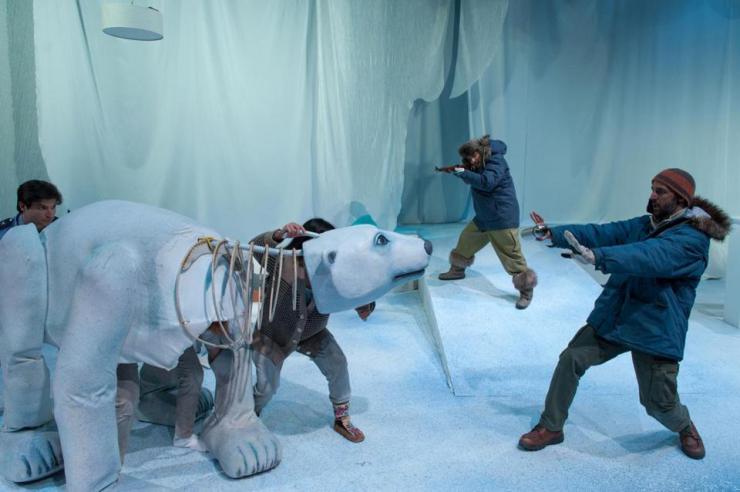
Links:
- Read Chantal’s original essay, “Why I’m Breaking Up with Aristotle.”
- Explore Chantal’s other writing for Howlround.
- Visit Climate Change Theatre Action’s website.
- Learn more about Artists and Climate Change, an initiative of the Arctic Cycle.
- Find out more about Chantal and her work at her website.
- To learn more about The Arctic Cycle, visit it's website.
You can subscribe to this series via Apple iTunes, Google Play Music, or RSS Feed or just click on the link below to listen:
Transcript:
Michael Lueger: The Theatre History Podcast is supported by HowlRound, a free and open platform for theatremakers worldwide. It's available on iTunes, Google Play, and howlround.com.
Hi and welcome to The Theatre History Podcast. I'm Mike Lueger. Chantal Bilodeau has broken up with Aristotle. That's the message of a 2016 essay that she wrote for HowlRound in which she explains how she's become dissatisfied with the ways in which classical dramatic theory influences the structure and content of today's theatre. Chantal is a playwright and translator and the artistic director of The Arctic Cycle, an organization that uses theatre to foster dialogue about our global climate crisis, create an empowering vision of the future, and inspire people to take action. Chantal is also one of the organizer's of the HowlRound convening Theatre in the Age of Climate Change, which will take place this June. Chantal, thank you so much for joining us.
Chantal Bilodeau: Thank you. It's nice to be here.
Michael: Can you explain what your relationship with Aristotle was like and why you broke up with him?
Chantal: Yes. I think like probably most playwrights who went through a master's degree, I got trained in playwriting using the Aristotle structure. And I'm very happy I got that training because that structure is very useful and it's something even though I said I was breaking up with him, it's something I always fall back on, it's tools that are useful to have. However, at some point in my development as a playwright, I felt like those tools were becoming a little bit restrictive and a little bit predictable, like it's a map that we know, that our audience knows, everybody sort of knows where we're going, and it was also the structure was something that was reinforced very much in playwriting development when I was working on a play and we would do readings and workshops and it seems to be the go to structure that everybody embraces and where we try to fit plays into.
It was when I wrote my play Sila, which is the first play of a cycle of eight plays about the Arctic, that suddenly the structure didn't quite fit for me and what I was trying to say. Even though I started with that idea, at some point I decided, "Oh, this doesn't work quite well and I have to find other ways to approach the story," and that's where I started thinking, "Okay, maybe the Aristotle structure is not the best way for this type of story."
Michael: Now you write in your essay about shifting from a hierarchical worldview to a heterarchical worldview. Can you explain to us what those terms mean and how they relate back to the concepts that you find in the Poetics?
Chantal: Yeah. So hierarchical, the best way to visualize that would be with a pyramid. It's sort of, it's how our world is built these days. There are people at the top, less people at the top, and then there are a lot more people at the bottom, and power and money and agency comes from the top and the people at the bottom have less of that. The heterarchical worldview is circular. It's not as much a power structure. It's a distribution of power. It's more collaborative. It's networks, so people are connected in a bunch of different ways. If there is power, it's more shifting, so it's not like one person or one entity always holds it. It kind of shifts depending on what's needed. It's also, I think another way to understand it, is the difference between a top down approach and a collaborative approach. In a heterarchy, in general more people have more agency.
In terms of Aristotle, I feel like the Aristotle structure is very linear and more along the lines of this pyramid where when usually the structure is you have one character sort of plowing through these obstacles to get to the end of the story and it's sort of a conqueror's mind, it's a structure where it's easy to put human beings at the center of the universe and to have us exert control over everything that's around us. And it's a very definite and singular point of view. Or two, you have like your protagonist and your antagonist, so you have one point of view and then you have the opposite point of view, and it's more difficult to tell stories that are more complex where there are multiple point of views that may influence each other and where the outcome is not as simple, winning or losing of the protagonist.
That's where it started to not work so well for me. This one play I mentioned, my play Sila that I was trying to write and where I felt that the Aristotle structure wasn't working so well, I went on a trip to Baffin Island, which is an island in the northern Canada, in the Canadian Arctic, and I had this idea of writing a play that would look at the opening of the northwest passage. This was several years ago. So how the northwest passage which is a maritime route in northern Canada because the ice was going to melt in the summer was going to be open to maritime traffic, and I thought, "Okay, so this is going to be a story of how the indigenous, the local indigenous population is being affected by this change."
After I went there, I felt that if I follow this idea I was telling, such a small part of the story, it was such a small slice of the pie that it was easy to misconstrue the whole thing or to look like I was pushing for a particular point of view, which is really not what I wanted to do. I wanted to look at complexity and interconnectedness. So that's when I had this crisis, existential crisis with Aristotle and I felt like I couldn't create this kind of complexity and interconnectedness on stage using those tools.
Michael: I'm really interested to hear about sort of how you see Aristotle reflected in contemporary theatre, and some of the shortcomings of using him as a model when we're trying to deal with all the issues facing us in the twenty-first century. What in your view are the central elements of Aristotle's theories that keep recurring in today's theatre and can you think of specific examples that might illustrate some of those issues?
Chantal: I think the winner versus loser story is problematic and it's hard to get away from when you have a protagonist and an antagonist, like somebody's going to win and somebody is going to lose. I think also the singular point of view is also problematic because it reduces the complexity of something to just one perspective. Oh, and another thing is the linear progression, the sort of die-hard cause and effect progression of the plot, especially in today's world where we have ... I mean when Aristotle wrote his principles, the world was very different, and now today we have quantum physical, we have biomimicry, we have the internet with all these intricate connections, and there's, it's so much more spread out.
I mean, just the experience of going online and following links on the internet to try to find information it's not a straight line. You just jump around and it's a series of connections and everywhere you ... at some point you get somewhere. I feel like the experience of modern life is very much like that, and these things that Aristotle or I guess they're preventing us from reflecting the world we are in today and the world we need to create, which is a more collaborative and a more sustainable world were power is more distributed, where there's more equity, and I feel like the structure of Aristotle's thought works against that.
Michael: Yes. I'm curious about sort of contemporary productions perhaps that may break with Aristotle, something you're familiar with that may have recently broken with Aristotle in a productive way?
Chantal: Yeah, I saw one production recently. It was a solo show and it was at Under the Radar Festival in New York City at the Public Theater, and this man, this show was called Remember Me, and the way it was described was it was a solo show, the performer turning himself into a human Hamlet mixtape was the description of the show. It was a combination of recorded audio, one actor on stage, some video, and it was more or less a collage. It wasn't ... I mean I couldn't tell you the story of it. Ultimately it's about these many actors who have played Hamlet in London, and then it zeroes in at some point on this one actor who ended up performing Hamlet while he had AIDS. This is in the '80s. And then he died shortly after, but he was very sick when he was performing it, so there was a different weight to his performance.
But that's not a story. That's just sort of what it's about. And it just unfolded in these, these very ... It was not even dreamlike structure. It was like putting together all these different perspectives to eventually create an understanding of what that one performance was.
Michael: What about your own work? You have been focusing with The Arctic Cycle on climate change, on its effects on our world. What do you think is particularly inadequate about Aristotelian dramaturgy, and what do you think might point the way forward for how we can deal with an issue like climate change through theatre?
Chantal: Some of the things I just said previously are some of the things that bother me in my own work too. So the limited point of view, how things tend to exist in their own separate boxes as opposed to all, everything being connected together I don't know exactly what the way forward is, but I guess I like the search, and when I write about this stuff is to maybe excite other people to search with me. I do think there's an aesthetic that we haven't found yet that's going to define this period in time and how we are going forward, and if we don't give ourselves the permission to try different things or even to question that Aristotle is the only way that you can write plays, then we're never going to find something new.
I do think this is all ... I think it's not a coincidence that all these things like climate change is happening and now we have the #MeToo movement happening and we have a lot of questioning of the capitalist system. These are all very much systems that are pyramids, where a lot of power is held at the top and then suddenly we are questioning this power and we are thinking, "No, things have to be done differently, there has to be more room for more people." This is true in the way we use resources, it's true in the way we deal with money, and it's true in terms of gender and racial equity.
I have a hard time believing that somebody who wrote principles of dramatic structure 2,000 years ago, that that still stands as is. I mean, he, it wasn't the same world at all, and it was also a man who was writing principle based on work that was done by men and for men. What he wrote has a lot of value, but it was a limited perspective. I guess I want to say what are the other perspectives, like let's keep that one as being one that served us very well, but how can we go further now?
Michael: We'll post a link to Chantal's essay, “Why I'm Breaking Up With Aristotle,” as well as additional information about her work with The Arctic Cycle and the forthcoming HowlRound Convening on Theatre in the Age of Climate Change. Chantal, thank you so much for explaining why you broke up with Aristotle to us.
Chantal: Thank you.
Michael: If you'd like to continue today's conversation, please visit howlround.com and follow HowlRound and @theaterhistory on Twitter and Facebook. You can also visit our website at theatrehistorypodcast.net where you can find links to all of our episodes. And you can email your questions and comments about the show to [email protected]. A big thank you to the staff at HowlRound who make this show possible. Our theme music is The Black Crook Gallop, which comes to us courtesy of the New York Public Library Libretto project and Adam Roberts. Thanks as well to Tim Kress, who designed our logo. Finally, thank you for listening.

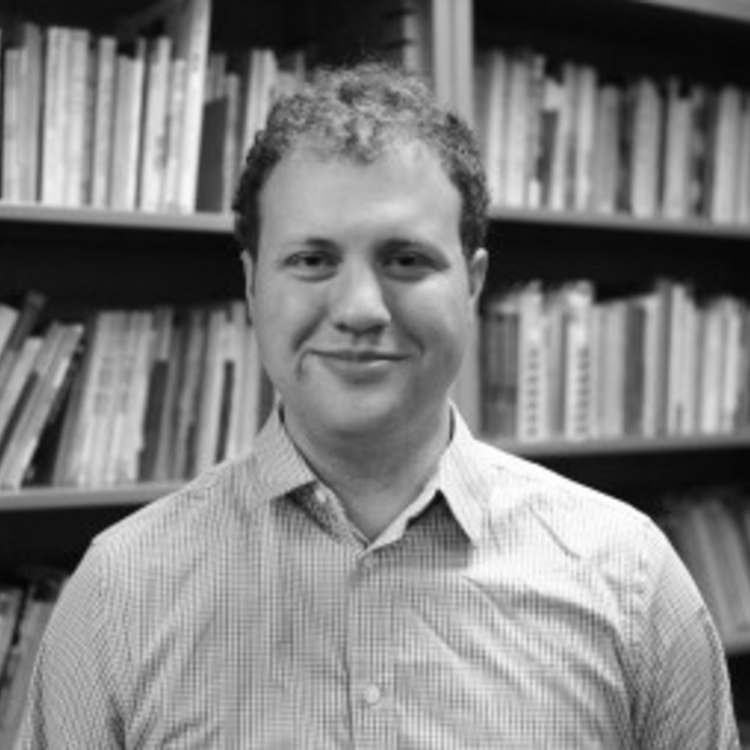
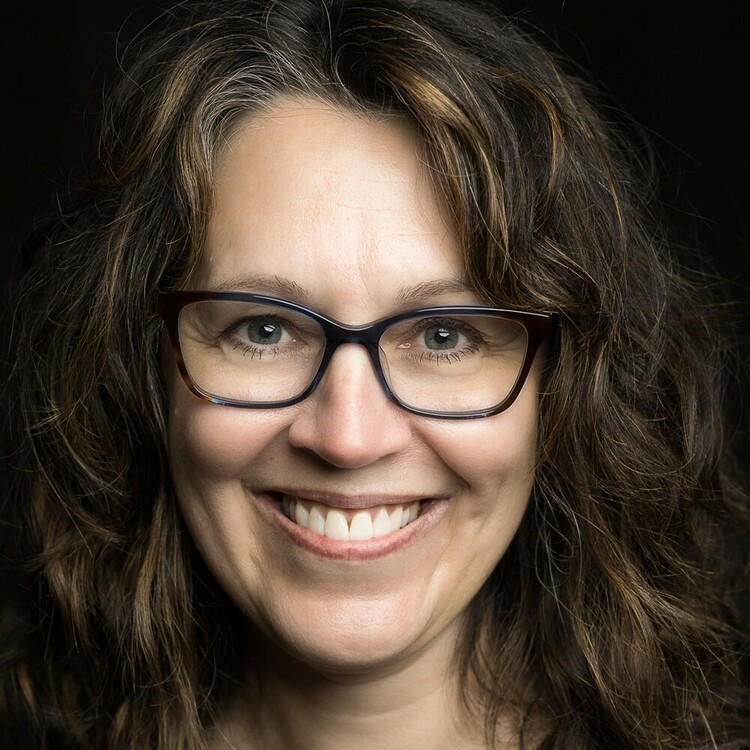

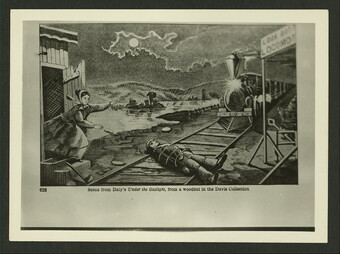


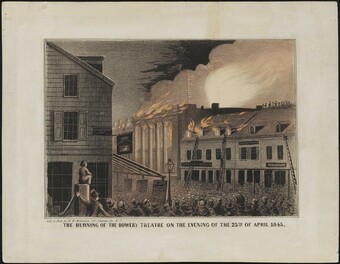

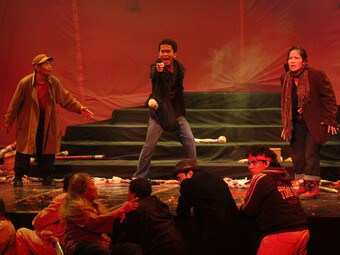

Comments
The article is just the start of the conversation—we want to know what you think about this subject, too! HowlRound is a space for knowledge-sharing, and we welcome spirited, thoughtful, and on-topic dialogue. Find our full comments policy here
What other examples (both in contemporary and earlier theatre) can folk provide of productions that "may break with Aristotle" or are heterarchical, circular, etc?